

Self-Advocacy chapter 5. Self-Advocacy chapter 4. CPI Information Processing Areas. What is 'Processing'?
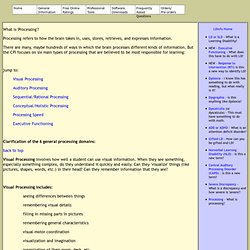
Processing refers to how the brain takes in, uses, stores, retrieves, and expresses information. There are many, maybe hundreds of ways in which the brain processes different kinds of information. But the CPI focuses on six main types of processing that are believed to be most responsible for learning: jump to: Visual Processing Auditory Processing Sequential/Rational Processing Conceptual/Holistic Processing Processing Speed Executive Functioning Clarification of the 6 general processing domains: Literacy and Learning Disabilities.
This section is designed to enable teachers, counselors, and other professionals to read, understand, and apply the information available in psychoeducational reports.
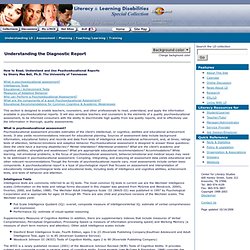
It will also sensitize teachers and counselors to the elements of a quality psychoeducational assessment, to be informed consumers with the ability to discriminate high quality from low quality reports, and to effectively use the information in thorough, quality assessments. What is psychoeducational assessment? Psychoeducational assessment provides estimates of the client's intellectual, or cognitive, abilities and educational achievement levels. It also yields recommendations relevant for educational planning. Sources of assessment data include background information, educational history and records and data from tests of intelligence and educational achievement, and, at times, ratings tests of attention, behavior/emotions and adaptive behavior. Academic Accommodations for Students with Learning Disabilities. PDF Version (294 KB) - get Acrobat Reader In recent years, the number of students diagnosed with disabilities who are attending postsecondary institutions has increased dramatically.
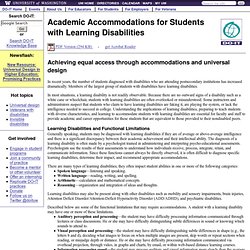
Members of the largest group of students with disabilities have learning disabilities. In most situations, a learning disability is not readily observable. Because there are no outward signs of a disability such as a white cane or wheelchair, students with learning disabilities are often overlooked or misunderstood. Learning Disabilities. Case Study 1 | Case Study 2 | Case Study 3 | FAQ | Resources Students with specific learning disabilities have average to above average intelligence but may have difficulties acquiring and demonstrating knowledge and understanding.
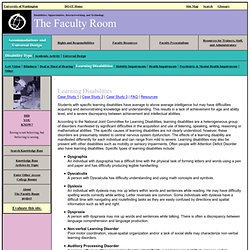
This results in a lack of achievement for age and ability level, and a severe discrepancy between achievement and intellectual abilities. According to the National Joint Committee for Learning Disabilities, learning disabilities are a heterogeneous group of disorders manifested by significant difficulties in the acquisition and use of listening, speaking, writing, reasoning or mathematical abilities. Science Labs. Case Study | FAQ | Resources Laboratory experiences are essential for students in many science courses.
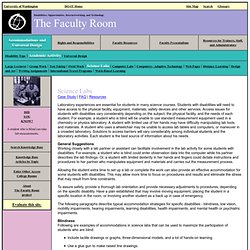
Students with disabilities will need to have access to the physical facility, equipment, materials, safety devices and other services. Access issues for students with disabilities vary considerably depending on the subject, the physical facility, and the needs of each student. For example, a student who is blind will be unable to use standard measurement equipment used in a chemistry or physics laboratory. A student with limited use of her hands may have difficulty manipulating lab tools and materials. Measuring Progress - Tests and Measurements for the Parent, Teacher, Advocate and Attorney by Pete and Pam Wright. Tests and Measurements for the Parent, Teacher, Advocate & Attorney by Peter W.
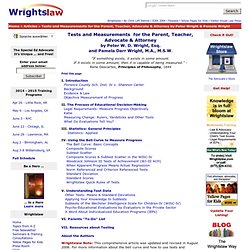
D. Wright, Esq. And Pamela Darr Wright, M.A., M.S.W. Suggested resources for parents from Dr. Adam Cox. Anger Center for Collaborative Problem Solving Dedicated to understanding and meeting the behavioral challenges of angry, inflexible children.
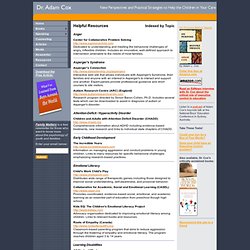
Dr. Adam Cox - Learn more about Boys of Few Words and how to parent them. Blackbaud NetCommunity. Child Games with Lesson Plan. Ten Tips for Engaging Underperforming Students. Guided by research, educators at Cochrane Collegiate have homed in on ten top teaching methods, and teachers receive weekly PD to help them implement the practices.
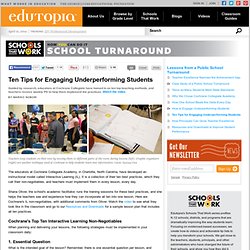
Watch the video. Teachers keep students on their toes by moving them to different parts of the room during lessons (left). Graphic organizers (right) are another technique used at Cochrane to help students learn new information. Credit: Zachary Fink The educators at Cochrane Collegiate Academy, in Charlotte, North Carolina, have developed an instructional model called Interactive Learning (IL).
Digests: Teaching Foreign Languages to At-Risk Learners. Resources Online Resources: Digests December 1996 EDO-FL-97-03 Teaching Foreign Languages to At-Risk Learners Elke Schneider, Miami University of Ohio.
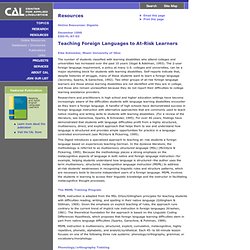
A Behavior Analyst Looks at Classroom Management - Middle Level Insider. ADD / ADHD and School: Helping Children with ADHD Succeed at School. Setting up your child for school success The classroom environment can be a challenging place for a child with ADD/ADHD. The very tasks these students find the most difficult—sitting still, listening quietly, concentrating—are the ones they are required to do all day long. Perhaps most frustrating of all is that most these children want to be able to learn and behave like their unaffected peers. Neurological deficits, not unwillingness, keep kids with attention deficit disorder from learning in traditional ways. As a parent, you can help your child cope with these deficits and meet the challenges school creates. Teaching ADD/LD Children to Follow Directions at School and at Home. Is it expecting too much for my child to do as I say?
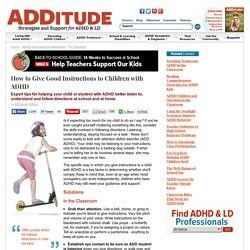
If you've ever caught yourself muttering something like this, consider the skills involved in following directions. Listening, understanding, staying focused on a task - these don't come easily to kids with attention deficit disorder (ADD ADHD). Your child may be listening to your instructions, only to be distracted by a barking dog outside. Learning Disabilities Association of America. The Frustration Profile: Strong Verbal Skills with Slow Processing Speed. Glen* is a third grader who was brought to testing to determine the best teaching style for him.
Testing revealed that Glen’s overall intelligence and academic skills were in the Average range. However, great variability exists within the tests. Glen demonstrated excellent Verbal Comprehension skills, while his Processing Speed Index and Perceptual Organization Indexes fell significantly below his other indexes. Do Your Teens Seem Like Aliens?
Tough New York Private Schools Try to Lighten Load.
Study tips. Dyslexia Treatment - Hints and Tips. - Our Special Needs room is referred to by all as the Goldfish Room on account of the tankful of exotic fish in the corner of the room! Our special needs children are always happy to come, and the other children even get a little jealous! (V.L., Hampshire, UK) - I purchased splatter screens that you use while cooking at a local dollar store. The kids love to put their paper on them to trace letters! (K.C., Texas) Response to Intervention in Secondary Schools: Is It on Your Radar Screen? Does your Gifted Child have ADD (ADHD)?
Home > Help > Parents/Children > Kathleen Nadeau, Ph.D. Misunderstood Minds . Attention. YouTube Lets Schools Opt for Educational Videos. Digital Tools Teaching Strategies Flickr:www_ukberri_net Teachers who have been frustrated over blocked access to YouTube educational videos in school can take heart. YouTube is rolling out a pilot a program with schools that will redirect all YouTube links to educational content on YouTube.com/education. In addition, comments will be disabled and related videos will only be educational, both of which are a source of anxiety around exposing kids to inappropriate content.
Each school and district has a different kind of filtering system, but this workaround allows schools that block YouTube at the domain level to access it through YouTube.com/education, according to Angela Lin, head of YouTube Edu. Flexibility on Tutoring Pleases Districts, Worries Industry. Published Online: October 10, 2011. Larry Ferlazzo’s Websites of the Day… - An Innovative Way For Students To Hire (& Fire) Tutors. Our very talented and innovative principal Ted Appel (you’ll be able to read an interview with him in Public School Insights that Claus von Zastrow will post there in a couple of weeks) recently came up with another excellent idea — this one related to students getting tutors. The 19 Learning Dysfunctions.
Resources for Special Needs. The Fry Readability Program. How to Study for a Final Exam in Middle School. Smart but Struggling: It Just Doesn’t Make Sense! Everyday Mathematics. For Teachers Resources by Grade Level. Download Depot of Free Teaching Materials, Teaching Today. The Download Depot features free, easy-to-use materials that you can download and use in your classroom today.
Each material has been designed with the busy teacher in mind. For the Love of Teaching: Increase Study Skills and Test Performance through Predictions. Making predictions utilizes the higher-order thinking skills of our frontal lobes. Teach students the metacognitive power of predictions to ensure interest, motivation, as well as current and future academic success. Before a test, encourage students to predict what information will be on it. The first couple of times walk students through the process. Question them about the information they feel is most likely to be on their test and why. Share ideas for determining importance. Study skills - test taking. Plan ahead and know expectations for your tests. Tests evaluate your proficiency with course content. Tests can be daunting because they are such an important part of your course grade, and knowing your faculty’s expectations can be difficult. One week before the exam, spend an hour reading through your notes. Untitled.
Memory Tips and Test Taking. Knowing More & Remembering it Longer Remembering Strategies Select Select what you want to remember. Ask the teacher Examine your class notes Read the text assignments Study the handouts Remember Choose your techniques that will help you remember. Study Skills Self-Survey. About Tri-Ed Tutoring - Arlington In-Home Tutoring Services.